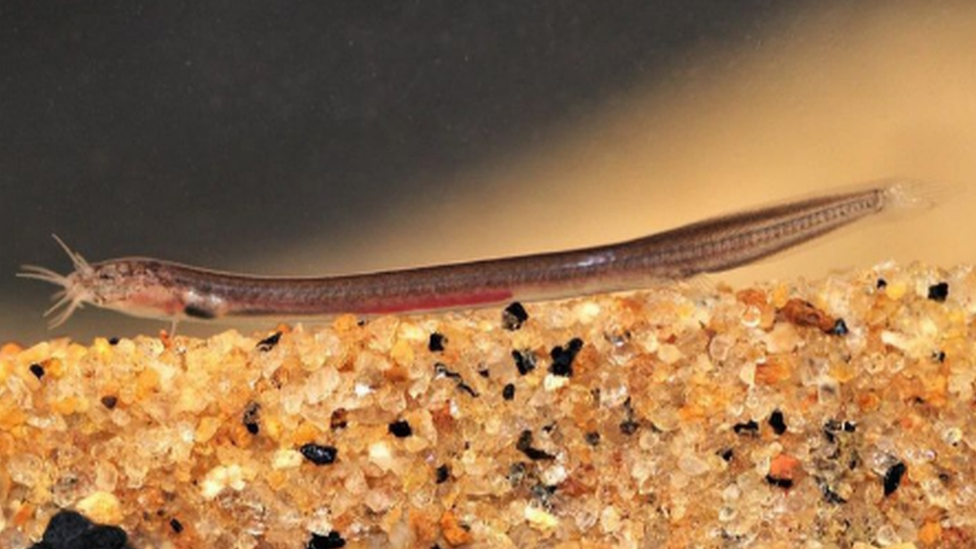Leonardo DiCaprio praises Indian man for discovering new fish in a bucket
- Published

Actor Leonardo DiCaprio posted about the new species on social media last week
An Indian man who discovered a rare new species of fish almost three years ago has found renewed fame after Hollywood superstar Leonardo DiCaprio praised him online.
Abraham A, a former paramilitary soldier from the southern state of Kerala, found a new species of subterranean fish called Pathala Eel Loach in 2020.
The fish gets its name from the Sanskrit word Pathala which means "below the feet", a reference to its subterranean nature.
The small, snake-like species lives in aquifers - large layers of permeable rock and sediments that hold groundwater.
Mr Abraham, who lives in Alappuzha district, said the discovery was made by chance - he was taking a bath when he spotted "a red thread in the bucket".
Intrigued, he scooped it out to take a closer look and found the thread was moving.
Mr Abraham placed it inside a glass jar and contacted a local college professor, Dr Vinoy Thomas, who put him in touch with researchers at the Kerala University of Fisheries and Ocean Studies (Kufos), who identified the new species.
Over the next few weeks, they found four more fish from the same species in Mr Abraham's well and water tank.
The fascinating discovery re-entered the spotlight last week when DiCaprio - an environmental campaigner - posted a colourful picture of the Pathala Eel Loach on Instagram and praised Mr Abraham.
"The wild is all around us and sometimes all it takes to discover a new species is going about a normal day," the actor said.
The discovery, DiCaprio wrote, showed "how citizen science" was the "key for researchers to study these unknown, underground ecosystems".

Mr Abraham found the new species in 2020
Normally, fish live in rivers, lakes or other surface water, but Pathala Eel Loach belongs to a group of subterranean fish which live in groundwater.
"We have around 17-18 such species in India and at least 11 of these are in Kerala," Dr Rajeev Raghavan, an assistant professor at Kufos, told BBC Hindi.
These fish are unique because they are only found in places such as India, China - which has the largest number of groundwater fish - and Mexico.
"Since these fish are found in groundwater, the only way to catch them is when they accidentally come out through taps," Mr Raghavan said.
The aquifers are connected to wells and when they dry up in summer, the fish sometimes appear there. Kerala has the highest density of homestead wells in India, with close to seven million structures in the state's highland and midland areas.
In Mr Abraham's case the fish could have gone from the groundwater into the well and from there to the water tank on the roof, before landing in his bucket through the tap.
"It is an accidental opportunistic kind of sampling," said Dr Raghavan.

Pathala Eel Loach lives in groundwater and is commonly found in aquifers
The scientist adds that not much was known about fish that live in groundwater until the 1950s. Their existence in Kerala was only confirmed in 2015 when Kufos started studying them under a project funded by the state government.
The university then launched a Citizen Science Network to teach people that such fish could land up through taps or at the bottom of dry wells.
"We told them to call us or send us a message. That is how we have collected more than 150 specimens of all the 11 species," Dr Raghavan said.
Scientists say the discovery of Pathala Eel Loach is also significant from an evolutionary point of view.
"Most groundwater fish are ancient," Dr Raghavan said, adding that a study of one of the 11 species found in Kerala found their origin dating back 125 million years - when dinosaurs still roamed the Earth.
"This means that all fish trapped in underground systems have been around for millions of years," he said.
For Mr Abraham, the discovery was significant from the beginning.
But it became even more special after DiCaprio's post. "Such a big man has taken my name. I am elated and very happy," he said.
BBC News India is now on YouTube. Click here, external to subscribe and watch our documentaries, explainers and features.

Read more India stories from the BBC:
